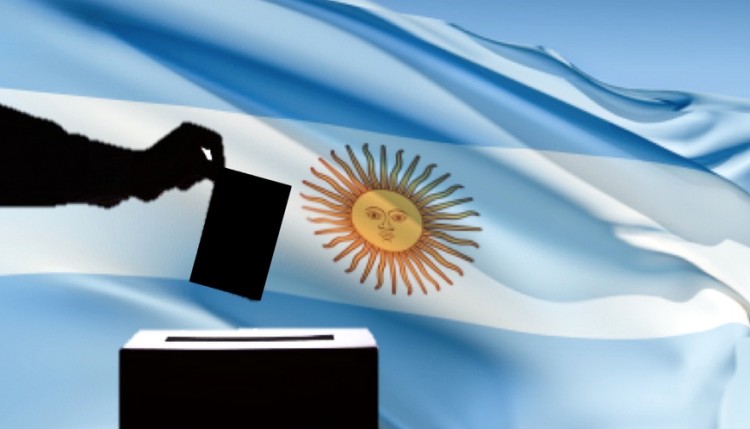
Election 2015 in Argentina: the environmental agenda of the candidates
Less than two months before the presidential election, LA RAZÓN contacted the six candidates who were elected in the PASO to meet their environmental proposals. What policies are they going to boost if they are elected president? What are their priorities? Renewable energy, fracking and climate change: a necessary debate axes.
By Tais Gadea Lara and Rafael Otegui.
2015, election year. The presidential candidates visit, for several months, major radio and television studios releasing their proposals and vision of the country. Much has been talked about economics, politics, education, security. But what about the environment? What are their priorities for sustainability? What structural policies they consider necessary to implement to take care of natural resources and ensure the welfare of future generations?
Less than two months after the general election, LA RAZÓN has contacted the six political spaces that were winners in the recent national primary to meet the green agenda of the candidates. Five themes were consulted to each of them: their analysis of the main environmental challenges that the country is facing, the measures that they would boost to respond to these challenges if they should become president, their vision of the future of renewable energy, their position saround fracking and exploitation of unconventional hydrocarbons, and adaptation and mitigation actions to address climate change.
Since the creation of a Ministry of Environment to raise environmental institutions in the country or seeking private investment to accelerate the take-off of renewable energies, to ban fracking and nationalization under workers’ control of the hydrocarbon industry, the proposals walk across the ideological spectrum and show the disparity of views on some issues. However, there are many points in common and are mainly related to the need of an effective enforcement of existing environmental laws such as the Forest Act, the Glacier or the Clean Energy.
Some candidates chose to answer the questionnaire form by telephone, others by email and other preferred to delegate their trusted advisers and technical equipment. In all cases, the responses allow a profile of each presidential candidate and the space they lead, and project the space that the environmental issues will take in future agendas of government.
DANIEL SCIOLI. Frente Para La Victoria (FPV) 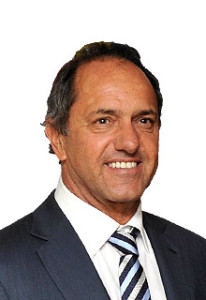
1. DIAGNOSIS. What are the major environmental challenges that the country is facing today?
Today climate change is our main enemy, and as we have said on more than one occasion, has arrived to stay. With countless facts, it has been demonstrated that its devastating effects are a reality and we must be aware of this and continue with the adaptation. Pope Francis, in his encyclical, he addressed the issue, because undoubtedly, is an issue that disproportionately affects the most vulnerable social sectors.
2. ENVIRONMENTAL POLICY. To become president, what specific measures would you push to address these challenges?
From the moment I decided to create an organization hitherto non-existent, I expressed my compromise and show concern for the environment. The intention is to project the experience of the Province of Buenos Aires at the national level and work it as a state policy. We must incorporate the environmental dimension at all levels of government. The protection of a healthy environment is at the center of our state policy.
3. ENERGY SYSTEM. What do you think is the future of renewable energy in Argentina, considering the low compliance with the target set in the Law 26.190?
I have the firm conviction to put Argentina at the forefront of alternative energy. I organized meetings and open discussions with businessmen to promote the use of renewable energies, creating the provincial Institute for Energy (IDE), carrying out major works such as the Solar Park in Samborombón, and initiating feasibility studies to build a wind park in the town of 9 de Julio. It is possible to think about the implementation of clean energy in Argentina, from a firm conviction, reflected in concrete management actions. They are decisions that will have its effect in the future, but it’s necessary that we continue creating the conditions so that we can talk about a renewable energy matrix.
4. FRACKING. What is your position about the fracking and exploitation of unconventional hydrocarbons?
Unconventional hydrocarbons constitute a unique opportunity to achieve energy sovereignty, that the country has ahead when it comes to reconciling the areas of economic development and sustainability. One example is the site of Vaca Muerta, where we make a qualitative leap in the discussion about the use of «fracking» method of extraction. Vaca Muerta makes a positive influence not only in Neuquén but also for the rest of the country, and we must enhance efforts to optimize its operation.
5. CLIMATE CHANGE. What measures are you going to take to face Climate Change?
The gases produced by climate change are perennial, remain in the atmosphere, and making a historical review from the beginning of the phenomenon of the Industrial Revolution to date, the United States and Europe are responsible for 70% of the gases in the atmosphere while representing only 14% of the population. For example: an English pollutes twice than an Argentine, a German pollutes 100 times than an Ethiopian. There are facts, the unusual lightning strikes, the sum of days longer that the weather service has record, and even rainfall with an intensity that generates unprecedented floods. The main objective of Argentina is to adapt to them, with more works, enabling us; while international agreements are those that will begin in earnest, with mitigation. Pope Francis’ words are the key to making the necessary awareness for the various world leaders to live up to the occasion.
MAURICIO MACRI. Propuesta Republicana (PRO). Alianza Cambiemos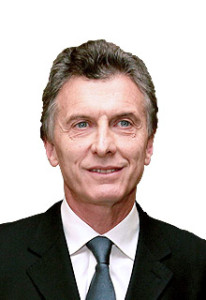
Answered by: the Green Team of Fundación Pensar.
1. DIAGNOSIS. What are the major environmental challenges that the country is facing today?
It is very difficult to establish a priority when the country abound conflicts and critical environmental situations that differ from region to region. However, we can point out three that are on our list of priorities. We have a loss of natural ecosystems due to lack of land use or weak enforcement of existing laws that sought to protect and manage fairly productive urban development activities and preserving ecosystems. We have serious process of pollution, with all the health and social problems in their populated areas, as is the case of the Matanza-Riachuelo that still affects millions of people. For a national environmental policy, energy activity is very important for its local impact, resource management and global impacts, such as climate change.
2. ENVIRONMENTAL POLICY. To become president, what specific measures would you push to address these challenges?
We plan to double the number of areas under the jurisdiction of National Parks. Argentina has a very large deficit in relation to its commitments in the Convention on Biodiversity. Regarding the protection of native forests, the highest priority should be the proper implementation of the Forest Act. Watershed management systems need to be generated, as it is Acumar for the Riachuelo, for its environmental and socially committed management. This goes hand in hand with a strong policy of modernization of the industrial system: environmental control and monitoring, and boosting the conversion of industries to clean production systems. For this technical assistance programs and credit lines are required for the industries to can meet the process; only in wind, the potential exceeds 50 times the electricity consumption of the country. The plan is to produce a takeoff of the renewable sector with all that implies in terms of employment, investment and industrial development over the next four years.
3. ENERGY SYSTEM. What do you think is the future of renewable energy in Argentina, considering the low compliance with the target set in the Law 26.190?
Being so far from that goal speaks clearly about the failure of energy policies.
4. FRACKING. What is your position about the fracking and exploitation of unconventional hydrocarbons?
Argentina has launched a road in the exploitation of unconventional hydrocarbon resources. To continue this development we must take care that they take reasonable care and environmental conditions such activity should be. This must be done without losing sight that Argentina not only has great potential in unconventional hydrocarbons, we also have several «Vacas Muertas» on renewable resources such as wind, solar and biomass.
5. CLIMATE CHANGE. What measures are you going to take to face Climate Change?o?
Adaptation measures will be very different depending on what region concerned; it is not the same the north, the Patagonia or the metropolitan area. The scenario that we live with floods in the central part of the country shows that we must do the works of hydraulic infrastructure for new flows and rainfall patterns we have today as a result of the heaviest rain; but it is not enough. We must also have early warning systems so that we can monitor how the evolve flows in each of the basins and detect when we enter to fire risk zone in order to have immediate response mechanisms.
SERGIO MASSA. Frente Renovador. Alianza UNA 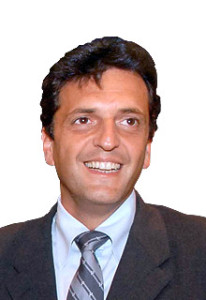
Answered by: Sergio Federovisky, responsible for environmental area of the Frente Renovador. Biologist, environmental journalist and author of «Argentina, back to the ecology».
1. DIAGNOSIS. What are the major environmental challenges that the country is facing today?
Restore institutionality in environmental issues. Argentina has today, after 30 years of democracy, the lowest environmental institutions. It is the only country in Latin America that does not have a Ministry of Environment and that reflects the low priority that the state gives to environmental policy. Generate public policies, facing the stage posed by climate change, in terms of adaptability and risk policies. Generating transversal policies so that the energy, agriculture, fuel, fishing and other productive activities have a central role in the area of environment in the definition of these policies.
2. ENVIRONMENTAL POLICY. To become president, what specific measures would you push to address these challenges?
Creation of a Ministry of Environment, Land and Disaster Risk Mitigation. Implementation of a federal program to mitigate disaster risks, ie adapting policy to the stage posed by climate change on the basis of having risk maps, coordinated action against the emergence and work from emergency to reduce vulnerability of society to new scenarios. Policies around two laws regarding the Glacier Law, propose the suspension of exploration permits until the Inventory of glaciers is finished. Regarding the Forest Act, we propose a suspension of the granting of land clearance permits until a commission made up of universities, provinces, experts, Nation, environmental NGOs, develop alternative policies so that the law will be applicable.
3. ENERGY SYSTEM. What do you think is the future of renewable energy in Argentina, considering the low compliance with the target set in the Law 26.190?
We need a state policy to diversify the energy matrix from the study of the subsidies and marketing activity extraction of fossil fuel and promote with subsidies the policies to generate clean, renewable, particularly wind and solar energy. In addition, work for the self-generation of energy and help non-conventional fuels.
4. FRACKING. What is your position about the fracking and exploitation of unconventional hydrocarbons?
We do not consider that the ban is a desirable element, or mining or fracking. Yes we must creat the conditions so that these activities that must be carried are carried out with the highest possible environmental performance. We propose to generate an external control activities through an agency to ensure transparency to the community.
5. CLIMATE CHANGE. What measures are you going to take to face Climate Change?tico?
The main one is the creation of a Federal Plan for Disaster Risk Mitigation. Plan because today there is no coordinated activity nationwide. Federal, because we can not cover in those jurisdictions. Mitigation involves early diagnosis, risk map and action to be taken in each of the situations, from waterworks to relocation of populations and rethinking agricultural activities.
MARGARITA STOLBIZER. Alianza Progresistas 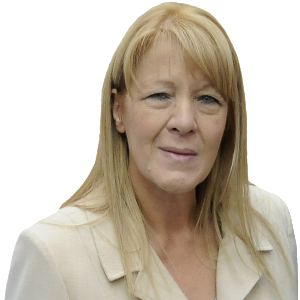
1. DIAGNOSIS. What are the major environmental challenges that the country is facing today?
Water and all that it entails: the need to ensure the basic human right of access to drinking water; the pollution situation faced by water for human consumption in many places; the lack of basic infrastructure services; the need to establish a state policy in relation to the consequences of climate change and flooding. Climatic factors can not be avoided, but it can be prevented to avoid or reduce damage. The lack of a development model that addresses environmental issues and therefore the necessary changes in the productive matrix and sustainability in the use of natural resources. The need for a change in the energy matrix, considering medium-term policies.
2. ENVIRONMENTAL POLICY. To become president, what specific measures would you push to address these challenges?
We will put in place a Comprehensive Management Plan. The look is to ensure everyone’s access to natural resources on equal terms. The other structural aspect of our policy will be linked to the development of cities, housing, social infrastructure and habitat. We will work on establishing a plan of environmental planning for an ecosystem approach to promote balance between conservation, production and urban development. We will promote a federal program for cleaner production to improve productivity and environmental management of enterprises; and develop a policy for environmental education. The structural measure will be the policy of alternative energy generation.
3. ENERGY SYSTEM. What do you think is the future of renewable energy in Argentina, considering the low compliance with the target set in the Law 26.190?
It is urgent to address the objectives of the law that the government has neglected, despite having the conditions to advance. We will design an energy plan of medium and long term, having as objective the effective diversification of the national energy matrix, increasing the share of alternative and renewable energy, and promoting the development of domestic enterprises.
4. FRACKING. What is your position about the fracking and exploitation of unconventional hydrocarbons?
It is necessary to fully implement the law of preservation of glaciers and periglacial environment, making environmental audits. The exploitation of unconventional hydrocarbons, the opened «megaminería», they are not part of our management proposal. Fracking produces adverse effects on the environment and people that can not be compensated with money incomes. It is a predatory activity affecting the populations of exploited areas. Together with provincial and municipal governments, we will push for a permanent program action under the principles of prevention, precautionary and responsible environmental policy.
5. CLIMATE CHANGE. What measures are you going to take to face Climate Change?
This government has a huge backlog in this area. We must launch an urgent plan that begins by setting the information and training needed to generate greater public and private awareness of the impact of climate change. Major efforts are being made by the municipalities. Then we create a network to recognize these initiatives, the spread and articulate. Decentralization help in managing resources for reducing greenhouse gases, improving water quality and waste. The most important policies will be focused on the areas of education, transportation and clean energy. Waste management to reduce pollution and waste tap. Technology investment. Law enforcement forests. Building building a water network for the prevention of climatic disasters.
NICOLÁS DEL CAÑO. Frente de Izquierda y de los Trabajadores 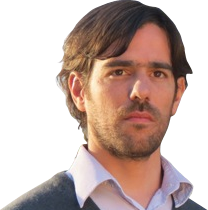
1. DIAGNOSIS. What are the major environmental challenges that the country is facing today?
Environmental challenges stem from the neoliberal current production models. Agribusiness, based on the monoculture of genetically modified soybeans and other grains, and the use of pesticides, with the immediate result in expanding the agricultural frontier populations and pollution. Opened «megaminería», with its great economic, environmental and social impact, as a basis for the exploitation of minerals. Real estate speculation, which prioritizes profit generation entrepreneurs on a rational plan for housing.
2. ENVIRONMENTAL POLICY. To become president, what specific measures would you push to address these challenges?
Nationalization without compensation and under workers’ control and management, banking, the great agricultural and industrial capital, mining, property in the hands of landlords, sowing pools, cold cereal and monopolies. Implementation of a Plan of Public Works, infrastructure and public housing based on progressive tax on large fortunes under management and workers and neighborhood organizations.
3. ENERGY SYSTEM. What do you think is the future of renewable energy in Argentina, considering the low compliance with the target set in the Law 26.190?
The outlook is far from encouraging. If there was no development of clean energy so far it is because of political decisions favoring the current methods linked to private and foreign capital. While the rulers remain functional to these interests, they are not going to take serious steps to implement large-scale alternatives such as solar, wind, hydro and geothermal.
4. FRACKING. What is your position about the fracking and exploitation of unconventional hydrocarbons?
We presented the project «Expropriation and nationalization of the oil industry» in which we denounced the fracking method as an environmental threat for multiple fractures at the level of bedrock, the possibility of migration of highly carcinogenic fluids to the groundwater and natural gas leaks to the surface.
5. CLIMATE CHANGE. What measures are you going to take to face Climate Change?
The policies needed to pursue a production based on the real needs of society. To do this, we must stop deforestation and restore forests, put agricultural production in terms of society and nationalize the oil industry and mining. They would be great steps towards reducing the emission of greenhouse gases. The fundamental solutions will only come by changing methods of capitalist production, whose priority is profit generation rather than the welfare of humanity in union with nature.
ADOLFO RODRÍGUEZ SAÁ. Alianza Compromiso Federal 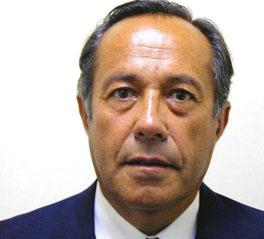
1. DIAGNOSIS. What are the major environmental challenges that the country is facing today?
The primary challenge is the theme of water, understood as a human right, which all Argentines have access to their consumption. Unfortunately, for many it becomes inaccessible, the sectors affected are low-income, poor; lack hits to the door of the metropolis, in the slums. The trash in the environmental management is another challenge, as the lack of investment to diversify energy sources, and strengthen renewables.
2. ENVIRONMENTAL POLICY. To become president, what specific measures would you push to address these challenges?
In drinking water and environmental sanitation, my proposal is to make a master plan with targets to be met through a federal agreement with the commitment of the Nation and the Provinces, because in this area flies the jurisdictional issue, which will include the municipalities with a monitoring system for the fulfillment of the works. On waste that invade us and pollute us, we’ll proper management serve for a dignified and well planned economic activity.
3. ENERGY SYSTEM. What do you think is the future of renewable energy in Argentina, considering the low compliance with the target set in the Law 26.190?
The use of water for energy production is one of the cheapest forms. If we think of the Argentina of the future, with a huge industrialized activity, we need energy. And San Luis have a photovoltaic megaproject 3,000 megawatts, 15% of all domestic production, with zero environmental impact. We have an obligation to create the conditions to ensure a renewable energy matrix, and my commitment to this issue is a priority in the country.
4. FRACKING. What is your position about the fracking and exploitation of unconventional hydrocarbons?
I am critical of the agreement between YPF and Chevron because I believe that the government ceded sovereignty, and I think the country has to summon investors with rules exist to provide confidence, with economic and legal certainty. Without these prerequisites, events occur as this case to assign jurisdiction in Vaca Muerta.
5. CLIMATE CHANGE. What measures are you going to take to face Climate Change?o?
Establish a master plan designed for the next 50 years. This problem progresses, is not to be produced. We already have effects that we live and we suffer. We must comply with the Forest Act. I propose a national forestry plan, which together with the water works that we are going to build, allows us to control flooding and its economic and social implications. Planting trees to prevent flooding is an extraordinary way to use water productively generating wealth.
| Article published on Gestión Sustentable, in newspaper La Razón |
